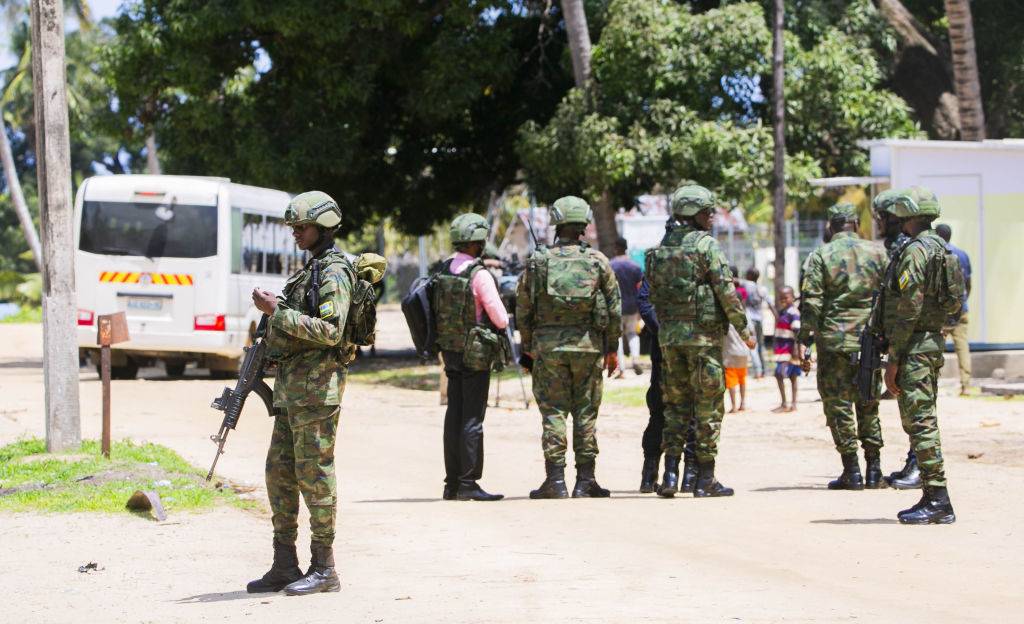
Rwanadian forces are using missiles in the Democratic Republic of Congo, according to a United Nations report. (Photo by Cyrile Ndegeya/Anadolu, Getty Images)
TRwandan troops are using advanced weapons, including surface-to-air missiles, to support the M23 rebel group in the escalating conflict in the eastern Democratic Republic of Congo, according to a United Nations document.
As fighting intensified in the Democratic Republic of the Congo, last Wednesday a missile believed to be a mobile surface-to-air missile (SAM) from the Rwandan Defense Forces was fired at a United Nations observation drone, but it did not hit. said the confidential report.
“French external military intelligence confirms the assessment that the alleged WZ551 6×6 IFV mobile SAM system is of Rwandan origin,” it added. Two aerial photos attached to the report show a six-wheeled armored vehicle with a radar and missile launch system mounted on its roof.
The photos were taken by the targeted drone about 70 kilometers north of the city of Goma in rebel-held Rutshuru territory. The U.N. peacekeeping mission in Monusco said in a statement that there are “no previous reports of known armed groups possessing the training, funding or resources to operate and maintain mobile SAM systems.”
It added that this “demonstrates the escalation of conventional armed conflict in the eastern Democratic Republic of the Congo.” The document points out that the M23 and the Rwandan army use numerous weapons against aircraft, including anti-aircraft guns and mobile air defense systems in their arsenals. Such weapons pose a high risk to all Democratic Republic of Congo government and UN aircraft in the region.
In late January, M23 spokesperson Willie Ngoma appeared in a social media video threatening Monusco with retaliation and accusing it of providing information on anti-government activities gathered by drones to “enemies”. Ngoma showed what he claimed was debris from a CH-4 drone flown by the Democratic Republic of Congo's military and shot down by rebels.
The DRC, the United Nations and Western countries allege that Rwanda is supporting the rebels in order to control its vast mineral wealth, a claim Kigali denies. Clashes have escalated in recent days between the Congolese army and the M23, one of the most powerful of the dozens of armed groups roaming the troubled east.
Local military spokesman Lt. Col. Guillaume Njike said military “battalions and supplies” had arrived in the area “for the safety of the population and the retaking of territory.”
The explosion forced thousands of civilians to evacuate the town of Salmon, on their way to Goma, the capital of North Kivu province. A “bomb” was dropped on a camp for displaced people near Goma on Monday, killing at least three people and injuring more than a dozen others, local sources said.
There was heavy fighting during the day in the Salmon region, 20 km west of the city. A civil society official blamed M23 for attacking the Zaina camp, saying, “Five people were killed and 15 injured.” Medical personnel reported that three of the 18 casualties had died.
Communications Minister Patrick Muyaya accused the Rwandan military of “launching bombs in the evening” and cited eight people seriously injured.
“There were terrible explosions on the hill,” a local witness said, adding that an armored UN vehicle was pelted with stones by young men who accused the peacekeepers of “collaborating with the enemy”.
United Nations forces have been in the Democratic Republic of Congo for nearly 25 years, but have been criticized for failing to protect civilians from armed groups. In December, the UN Security Council voted to accept Kinshasa's request for withdrawal despite the unstable situation.
Authorities in the Democratic Republic of Congo tightened security outside embassies and United Nations buildings on Monday after they were targeted by demonstrators who accused Western countries of supporting M23.
Protests broke out last week in Kinshasa and the southeastern city of Lubumbashi. Last Friday, dozens of young people demonstrated outside the French and British embassies, and earlier in the week they also demonstrated outside the American embassy.
The government announced late Sunday that it would beef up security at its embassy, and security was beefed up in several parts of the capital on Monday. Dozens of young people also gathered for a new march, with burnt tires on the sidewalks.
As a precautionary measure, foreign schools were closed from Monday morning, and some shops in central Kinshasa were also closed. —AFP

